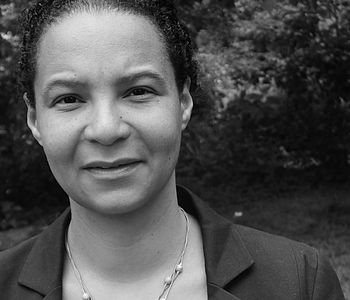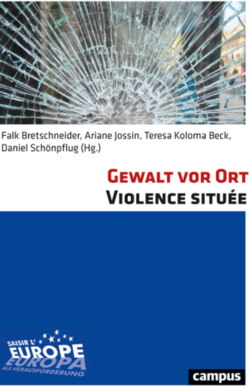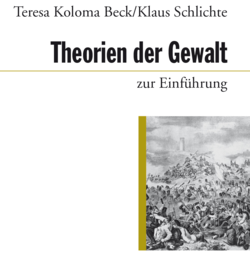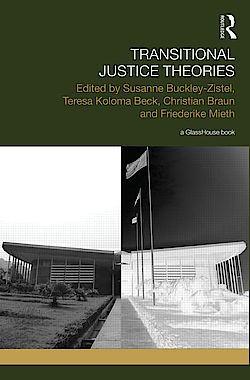Dr. Teresa Koloma Beck | Associated Researcher
Former Member
Position
:
Head of the research group "Violence and space" in the Franco-German research network "Seizing Europe"
|
Biography
Teresa Koloma Beck is a sociologist, specialising in conflict and violence research. She holds diploma degrees from the I.E.P. Paris, France and the University of Witten/Herdecke, Germany and a PhD from Humboldt University Berlin. Her research focusses on the social dynamics of everyday life in violent conflicts. At the Centre Marc Bloch, she is heading, together with Ariane Jossin, the research group "Violence and space" within the Franco-German research project "Saisir l’Europe – Seizing Europe". Before she substituted the Chair for International Conflict Management at the Willy Brandt School of Public Policy of Erfurt University. From 2009 to 2012, she worked on social transformation in postconflict societies in the framework of the collaborative research projekt "The Politics of Building Peace" at the Center for Conflict Studies at Philipps University Marburg. From 2004 to 2009, she was a part of the research group "Micropolitics of Armed Groups" at Humboldt University Berlin, where she concluded a PhD about normalisation processes in civil wars. Before starting her academic career she worked in organization consulting. She is member of the standing group "Orders of Violence" within the German Association of Political Sciences (DVPW) and of the section "Political Sociology" within the German Sociological Association (DGS). In the framework of her research on war and postwar societies, she spent extended time of field research in Angola (2005/06), Mozambique (2010) and Afghanistan (2016).
Researchtopic
Politische Soziologie der Weltgesellschaft, insbesondere
- Konflikttheorie und empirische Konfliktforschung
- Gewalttheorie und empirische Gewaltforschung
- Globalisierungssoziologie
Alltags- und Körpertheorie/-soziologie, insbesondere phänomenologische und pragmatistische Ansätze
Raumsoziologie
Projects
VIOLENT CONFLICTS AND GLOBALIZATION
Among the dynamics of globalization are not only processes of economic, political or cultural integration, but also conflicts staged and carried out in the horizon of world society. Such conflicts cannot be attributed to one particular place or region. Instead they are characterized by a multiplication of relevant spatial and placial references. Driven by the expansion of economic, social, political and communication networks, such plurilocal conflicts seem to play an increasing role in the dynamics of world society (1). In social theory, however, little attention has been payed to such processes so far. This is partly due to the tendency of globalization research to conceive its subject in terms of integration: the concept is commonly considered to refer to the expansion and intensification of informational, social, economic, political and cultural exchanges. In this perspective, conflicts – especially violent ones – appear as disturbances or disruptions.
Against this background, this research explores the relation between globalization and violent conflicts. It asks how violent conflicts contribute to the production of »globality«. How are places and spaces produced in plurilocal conflicts and how do they relate to each other? How can these processes be theorized and systematically investigated in empirical research? To answer these questions, the research combines classical conflict sociology with a constructivist approach in globalization sociology that is based in communication theory. The former reconstructs conflict as a form of socialization in which social structures are (re-)produced and transformed by processing an antagonism (2); the latter conceives globalization in terms of observation and communication processes which produce converging horizons of imagination and expectation and thus produce and entertain the fiction of a »global public« (3). Combined the two approaches open up an alternative perspective on the relation between globalization and violent conflict. Instead of considering conflicts as indicators of dysfunctionalities, attention is drawn to the production of social structures in violent conflicts and thus to the complex relations between dynamics of violence, dynamics of conflict and dynamics of globalization. The interplay between a given conflict on the one hand and global processes of observation and communication on the other is of crucial importance (4). This perspective emphasizes the complex interdependencies between violent interaction on the one hand, and the observation of and communication about this interaction by third parties and, hence, draws, attention to the translocal effects of violence.
(1) In empirical research, such conflicts are sometimes labelled as »transnational«. This concept is, however, avoided here, as it is bound to the idea of national states and evokes first and foremost the image of a transgression of state boundaries.
(2) See especially Simmel, Georg. 1904. The sociology of conflict. I. The American Journal of Sociology 9, no. 4: 490-525, and Coser, Lewis A. 1956. The functions of social conflict. Glencoe: Free Press.
(3) See for example Holzer, Boris, Fatima Kastner and Tobias Werron. 2014. From globalization to world society. Neo-institutional and systems-theoretical perspectives. New York: Routledge.
(4) For a first conceptual sketch see Koloma Beck, Teresa and Tobias Werron. 2013. Gewaltwettbewerbe. ›Gewalt‹ in globalen Konkurrenzen um Aufmerksamkeit und Legitimität. In Ordnung und Wandel in der Weltpolitik. Konturen einer Soziologie der Internationalen Beziehungen. Edited by Stephan Stetter. Baden-Baden: Nomos, 239-267. (English translation in preparation)
Organisation of Events
2015 (upcoming). »L'Europe et la fabrique de la justice: justices, injustices et solidarités à l'épreuve des crises«, Summer School of the French-German Research Network Saisir l‘Europe in Moulin d‘Andés (funded by DFH)
2015 (upcoming). »Zur Rolle von Dritten in den sozialen Dynamiken der Gewalt. Theoretische und Empirische Perspektiven«. Workshop of the research group »Violences et Espaces | Urbane Gewalträume« at the Centre Marc Bloch at Humboldt University Berlin
2014. »Lokale Konflikte vor globalem Publikum. Gewalt und Aufmerksamkeit in der Weltgesellschaft«. Panel at the IV. Open Conference of the Section on International Relations in the German Association of Political Sciences (DVPW) at Otto von Guericke University Magdeburg
2014. Stadt – Land – Fluss: Gewalt, Raum und soziale Ordnung, 25th Workshop of the Standing Group »Orders of Violence« in the DVPW at the Centre Marc Bloch at Humboldt University zu Berlin (with Bettina Engels)
2014. French-German winterschool of the research network »Saisir l‘Europe | Seizing Europe« at Goethe University Frankfurt/Main; responsible for the sub-programme »Spaces of Violence«
2013. »Political Violence in the City«, Roundtable in the framework of the colloquium »Sustainable Partnership« of the DAAD
2012 »Widerstand und Herrschaft in der Weltgesellschaft«, plenary session organised by the standing groups »Orders of Violence« and »Sociology of International Relations« at the 25th Congress of the German Association of Political Sciences (DVPW) at Eberhard Karls University Tübingen (with Matthias Ecker-Erhardt, Anna Holzscheiter, Alex Veit, André Bank)
2012. Armed Conflict and the Everyday at the Willy Brand School of Public Policy of Erfurt University, 2012, founded by the DAAD
2012 »Politics and Politicisation of Transitional Justice after Violent Conflict«, Panel at the IPSA-AISP World Congress at Madrid University (with Susanne Buckley Zistel et al.)
2011 »Theories of Transitional Justice«, Panel at the 6th ECPR General Conference at the University of Iceland, Reykjavik (with Susanne Buckley Zistel et al.
Miscellaneous
SELECTED PUBLICATIONS
forthcoming, "Widerstand und Herrschaft in der Weltgesellschaft. Einleitung zum Forum", Zeitschrift für Internationale Beziehungen (peer-reviewed)
forthcoming »Krieg und Gewohnheit. Phänomenologische und pragmatistische Perspektiven auf verkörpertes Gedächtnis in Bürgerkriegen«, in Oliver Dimbath und Michael Heinlein (Hgg.), Der Körper als Gedächtnis? Potenziale und Grenzen praxistheoretischer, alltags- und körpersoziologischer Zugänge zu sozialem Erinnern und Vergessen, Wiesbaden: Springer VS
2014 »Analyse des phénomènes de violence au regard de l’espace«. Revue de l’Institut Français d’Histoire en Allemagne, No. 6 (with Ariane Jossin, forthcoming)
2014 "Gewalt. Eine europäische Gretchenfrage", Secession. Ein Projekt der Europäischen Gesellschaft der Autoren (SEAU), http://www.seua.org/secession-teresa-koloma-beck-de/
2014 Gewalttheorien zur Einführung, Hamburg: Junius (mit Klaus Schlichte)
2013. "Violence et espace urbain. Un axe de recherche du réseau Saisir l’Europe". Revue de l’Institut Français d’Histoire en Allemagne [online edition] , No. 5 (with Ariane Jossin)
2013. “Gewaltwettbewerbe. ‘Gewalt’ in globalen Konkurrenzen um Aufmerksamkeit und Legitimität.” In Stetter, Stephan, Soziologie der Internationalen Beziehungen (= Leviathan Sonderband 28), Baden-Baden: Nomos (mit Tobias Werron)
2013 “Forgetting the embodied past. Body memory in Transitional Justice.” In Susanne Buckley-Zistel, Christian Braun, Teresa Koloma Beck, and Friederike Mieth, Transitional Justice Theories. London: Routledge
2013. Transitional Justice Theories. Ed. by Buckley-Zistel, Susanne, Christian Braun, Teresa Koloma Beck, and Friederike Mieth. London: Routledge
2013 "Redressing Violence in Africa", in Arrigo, Bruce, Bersot, Heather, The Routledge Handbook of International Crime and Justice Studies, London: Routledge (with Susanne Buckley-Zistel, Friederike Mieth, Julia Viebach)
2012 The Normality of Civil War. Armed Groups and Everyday Life in Angola, Frankfurt/Main: Campus
2011 "The eye of the beholder. Violence as a social process", International Journal of Conflict and Violence, 5 (2), 346-56
2009 "Staging society. Sources of loyalty in the Angolan UNITA", Contemporary Security Policy, Vol. 30 No. 2 (peer-reviewed)
2009 "Jenseits der Drohung. Vorschlag eines systemtheoretischen Forschungsprogramms zur Kriegsgewalt", Working Paper des DFG-Netzwerks Konstruktivistische Konfliktforschung (NeKoKo)
2008 "’Manchmal unser einziger Halt…’. Mission, Kirche und Religiosität im angolanischen Bürgerkrieg", Interkulturelle Theologie, Vol. 34, No. 3, 274-281
2008 "Natur und Zivilisation im Habitus des Kriegers", in: Karl-Siegbert Rehberg (Hrsg.), Verhandlungen des 33. Kongresses der Deutschen Gesellschaft für Soziologie in Kassel 2006, Frankfurt a.M.: Campus (mit Klaus Schlichte)
2007 „Nature and civilization in the Habitus of the Warrior (Serbia and Angola)“, Working Papers Micropolitics No.1 / 2007, (mit Klaus Schlichte)
Gewalt vor Ort. Violence située
December 16, 2020Falk Bretschneider , Teresa Koloma Beck , Daniel Schönpflug , Ariane Jossin
Collection: Raum - Körper - Kommunikation. Espace - Corps - Communication
ISBN: 9783593507989
Seit einigen Jahren wächst in der Gewaltforschung das Interesse an raumtheoretischen Analysen. Anhand qualitativer Fallstudien gehen die Beiträge dieses Bandes der Frage nach, wie Gewaltdynamiken soziale Räume prägen oder verändern und wie umgekehrt soziale Räume Gewaltdynamiken beeinflussen.
Was ist Gewalt? Wie wird sie erklärt? Wie wird staatliche Gewalt begründet und warum wird sie kritisiert? Und wie lassen sich Gewaltphänomene in Gegenwart und Geschichte erklären und verstehen? Diese Einführung stellt Sozialtheorien der Gewalt vor, die sich der Frage nach dem Verhältnis von Gewalt und sozialer Ordnung widmen. Sie diskutiert zunächst die wichtigsten Argumente der Staatstheorie, mit denen, beispielsweise durch Hobbes, Locke und Kant, die Monopolisierung der Gewalt begründet wurde, und zeichnet sodann die Kritiken der staatlichen Gewalt bei Marx, den Anarchisten oder im Widerstandsrecht nach. In einem zweiten Teil behandelt sie Theorien, die Gewalt erklären und einem sozialtheoretischen Verständnis zuführen wollen wie die Arbeiten von Trotha, Sofsky, Reemtsma oder Collins. Besondere Aufmerksamkeit gilt dem paradoxen Verhältnis moderner Gesellschaften zur Gewalt, in denen Gewaltexzesse und normative Ächtung der Gewalt koexistieren.
"Transitional Justice Theories"
December 31, 2013Teresa Koloma Beck , Susanne Buckley-Zistel, Christian Braun, Friederike Mieth
Transitional Justice Theories is the first volume to approach the politically sensitive subject of post-conflict or post-authoritarian justice from a theoretical perspective. It combines contributions from distinguished scholars and practitioners as well as from emerging academics from different disciplines and provides an overview of conceptual approaches to the field. The volume seeks to refine our understanding of transitional justice by exploring often unarticulated assumptions that guide discourse and practice. To this end, it offers a wide selection of approaches from various theoretical traditions ranging from normative theory to critical theory. In their individual chapters, the authors explore the concept of transitional justice itself and its foundations, such as reconciliation, memory, and truth, as well as intersections, such as reparations, peace building, and norm compliance.
This book will be of particular interest for scholars and students of law, peace and conflict studies, and human rights studies. Even though highly theoretical, the chapters provide an easy read for a wide audience including readers not familiar with theoretical investigations.
Publications
Monographien und Herausgeberschaften
2014. Theorien der Gewalt zur Einführung. Hamburg: Junius (mit Klaus Schlichte)
2014. Transitional Justice Theories. London: Routledge (herausgegeben mit Susanne Buckley-Zistel, Christian Braun und Friederike Mieth)
2012. The Normality of Civil War. Armed Groups and Everyday Life in Angola, Frankfurt/Main; New York: Campus
Aufsätze
2016. »Krieg und Gewohnheit. Phänomenologische und pragmatistische Perspektiven auf verkörpertes Gedächtnis in Bürgerkriegen«. Der Körper als soziales Gedächtnis, Hrsg. von Michael Heinlein, Oliver Dimbath, Larissa Schindler und Peter Wehling. Wiesbaden: Springer, 153-169
2015. »Paris – Syrien. Über zu kurze Wege in der öffentlichen Debatte nach den Anschlägen vom 13. November 2015 in Paris«, in: Zeitgeschichte-online, Dezember 2015
2015 »Widerstand und Herrschaft in der Weltgesellschaft«. Zeitschrift für Internationale Beziehungen (ZIB), Jg. 22, H 1, 103-116 (mit Alex Veit) (peer-reviewed)
2015. »Analyse des phénomènes de violence au regard de l‘espace« Revue de l’Institut Français d’Histoire en Allemagne, No. 6 (mit Ariane Jossin)
2014. »Zum Begriff des Gewaltwettbewerbs. Typen und Konstellationen globaler Konkurrenzen um Aufmerksamkeit und Legitimität«. In Martina Löw (Hg.). Vielfalt und Zusammenhalt. Verhandlungen des 36. Kongresses der Deutschen Gesellschaft für Soziologie in Bochum 2012. Frankfurt a.M.: Campus (mit Tobias Werron)
2013. »Gewaltwettbewerbe. ›Gewalt‹ in globalen Konkurrenzen um Aufmerksamkeit und Legitimität.« In Stephan Stetter (Hg.). Ordnung und Wandel in der Weltpolitik. Konturen einer Soziologie der Internationalen Beziehungen (= Leviathan Sonderband 28). Baden-Baden: Nomos. 239-67 (mit Tobias Werron) (peer-reviewed)
2013. »Forgetting the embodied past. Body memory in Transitional Justice«. In Susanne Buckley-Zistel, Teresa Koloma Beck, Christian Braun and Friederike Mieth (eds.), Transitional Justice Theories. London: Routledge,184-200 (peer-reviewed)
2013. »Redressing Violence in Africa«, in Arrigo, Bruce, Bersot, Heather (Eds.), The Routledge Handbook of International Crime and Justice Studies, London: Routledge, 471-92 (mit Susanne Buckley-Zistel, Friederike Mieth, Julia Viebach)
2013. »Violence et espace urbain«. Revue de l’Institut Français d’Histoire en Allemagne, No. 5 (mit Ariane Jossin)
2011. »The Eye of the Beholder. Violence as a Social Process. International Journal of Conflict and Violence, 5 (2), 345-56 – Russische Übersetzung in Vorbereitung – (peer-reviewed)
2010. »Is There A Market For Humanitarian Crisis Interventions? International Regimes For The Prevention or Ending of Genocide Seen From an Institutionalist Perspective«. discussion papers. Fakultät für Wirtschaftwissenschaft, Universität Witten/Herdecke. No. 5/2010
2009. »Staging society. Sources of loyalty in the Angolan UNITA«. Contemporary Security Policy. Vol. 30 Heft 2 (peer-reviewed)
2008. »’Manchmal unser einziger Halt…’. Mission, Kirche und Religiosität im angolanischen Bürgerkrieg«. Interkulturelle Theologie. Vol. 34, Heft 3, 274-281
2008. »Natur und Zivilisation im Habitus des Kriegers«. in: Karl-Siegbert Rehberg (Hg.). Die Natur der Gesellschaft. Verhandlungen des 33. Kongresses der Deutschen Gesellschaft für Soziologie in Kassel 2006. Frankfurt a.M.: Campus (mit Klaus Schlichte)
2007. »Nature and civilization in the Habitus of the Warrior (Serbia and Angola)«. Working Papers Micropolitics No.1, (mit Klaus Schlichte).


